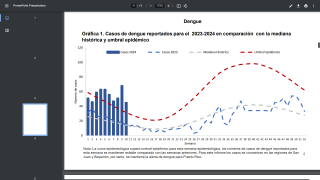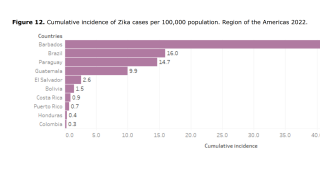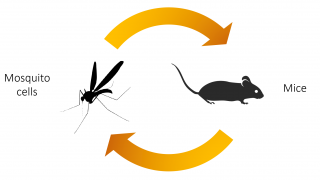10% of Dominican Republic Pregnant Women Infected With Zika Reported Fetal Loss

A new analysis reported almost 10 percent of pregnancies with a known outcome resulted in early fetal loss stemming from the 2016–2017 Zika outbreak in the Dominican Republic.
And, there were 3 cases of microcephaly reported.
This new data was published by the Centers for Disease Control and Prevention (CDC) on January 17, 2019.
This analysis was based on the Dominican Republic Ministry of Health who identified 1,282 pregnant women with suspected Zika virus infection, a substantial proportion during their first trimester.
First-trimester prenatal exposure was highly associated with fetal loss, and fever was associated with prematurity.
The odds of premature live birth were also increased for women with fever at the time of infection.
In the multivariable adjusted analyses, women infected with Zika virus during the first trimester were more likely to have an early fetal loss than term birth, controlling for maternal age and symptom of fever at infection.
Additionally, advanced maternal age was not associated with prematurity or fetal loss in this study, a finding that is not surprising in this cohort because most older women (92%) were 30–35 years of age, a range below the usual threshold for pregnancy complications.
Zika virus infection can lead to birth defects and pregnancy complications even when the mother is asymptomatic, but this report contains only surveillance data. Women had to be symptomatic to trigger reporting to the MoH, and thus, it is not possible to estimate the burden of disease in asymptomatic women and their infants.
This new study’s findings are similar to a 2017 study published in JAMA.
That study found among pregnant women in the United States with completed pregnancies and laboratory evidence of possible recent Zika infection, 6 percent of fetuses or infants had evidence of Zika-associated birth defects, primarily brain abnormalities and microcephaly.
Whereas among women with first-trimester Zika infection, 11 percent of fetuses or infants had evidence of Zika-associated birth defects.
Zika virus is a flavivirus transmitted by the bite of the Aedes mosquito, horizontally through sexual transmission, and vertically during pregnancy and delivery, says the CDC.
Most persons infected with Zika virus are asymptomatic or experience a relatively mild self-limited illness characterized by fever, conjunctivitis, arthralgia, and rash.
In adults, a Zika virus infection has been associated with Guillain-Barré Syndrome and meningoencephalitis.
To alert Americans visiting various Carribean Islands, the CDC updated its Alert Level 2, Practice Enhanced Precautions, regarding Zika outbreaks on August 7, 2018.
The CDC said all travelers to these Zika hot-Zones should strictly follow steps to prevent mosquito bites during and after the trip.
On January 2, 2019, the CDC confirmed 64 Zika cases in travelers returning from affected areas and US Territories reported 116 Zika virus disease cases during 2018.
As of January 31, 2019, there is not an approved preventive vaccine or treatment medication for the Zika virus, says the CDC.
Our Trust Standards: Medical Advisory Committee

























